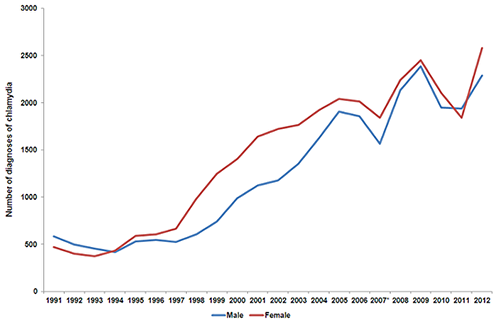Chlamydia – The Facts
- Commonest STI in the UK
- 70% of women and 50% of men who have it show no symptoms
- Chlamydia is on the increase
- Chlamydia can cause infertility
- Easily treatable with antibiotics


What is it?
Chlamydia is a sexually transmitted infection (STI) caused by bacteria (a microscopic organism). Approximately 75% of women and 50% of men show absolutely no symptoms of the disease whatsoever after infection. The issue is that if left untreated, Chlamydia can permanently damage the sexual organs leading to infertility in women and in men.
Why bother getting tested?
The worry is that Chlamydia can lead to infertility, but is easily treatable if caught early. Moreover, most women infected with Chlamydia have no symptoms. If left untreated, women may develop Pelvic Inflammatory Disease (PID). In addition, Chlamydia in pregnant women can lead to a higher risk of miscarriage, early delivery and potentially fatal tubal (ectopic) pregnancy. In men, Chlamydia may also reduce fertility. If the baby is exposed during delivery, he or she could suffer from eye infections, pneumonia or other serious health problems.
Current recommendion in the UK is for annual Chlamydia screening for all sexually active females aged 25 and under and for women older than 25 with risk factors such as a new sex partner or multiple partners.
How do you get it?
You can get Chlamydia through sexual contact with an infected person. Chlamydia can thrive in various regions of the body including the penis, vagina, anus, and throat so unprotected contact with any of these areas may lead to infection.
How would you know if you have it?
The problem with Chlamydia is that it shows no symptoms in over 50% of people who have it. Therefore, it is often difficult to tell whether you are infected. For those people who get symptoms, they usually include:
Burning or painful sensation when urinating.
For women, discharge from the vagina, back pain, unusual pain during sex and bleeding between periods.
For men, a discharge from the penis, inflamed or swollen testicles and/or discomfort around the tip of the penis.
Testing and screening for chlamydia
Testing for Chlamydia is easy, fast and painless.
We simply require a urine sample, ideally collected at least 3-4 hours since last urinating.
This concentrated sample is then tested using the most sensitive laboratory analysis and the result is usually available within 4-5 working days.
It is very important to recognise that chlamydia often co-exists with other sexually transmitted infections.
This is why we recommend a urine screen for 7 common STIs whenever there is a risk of chlamydia.
The 7 infections are:
Chlamydia, gonorrhoea, herpes I/II, mycoplasma vaginalis, ureaplasma, trichomonas and Gardnerella.
Most of these (except for herpes I/II) are treatable with antibiotics that we are happy to prescribe.
How is chlamydia treated?
Chlamydia is totally curable and can be easily treated with a single dose of antibiotics.
It’s that simple.
Chlamydia tests are confidential and quick but should always be part of a screen as it co-exists with other infections such as gonorrhoea, mycoplasma, ureaplamsa, trichomonas and gardnerella.
Our medical team will advise on how to move on from your sexual health concerns.

This is how we do it @ Regent Street Clinic™
The whole thing takes 5 minutes.
No swabs. No blood. No pain.
It’s always better to know.
